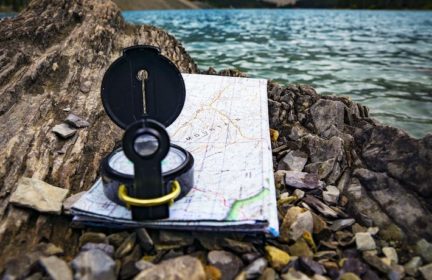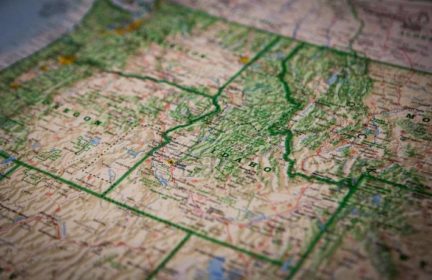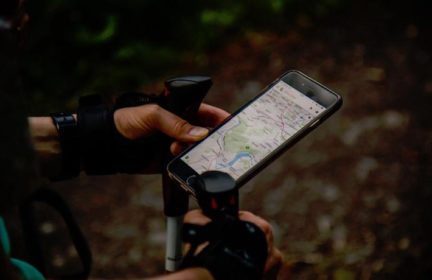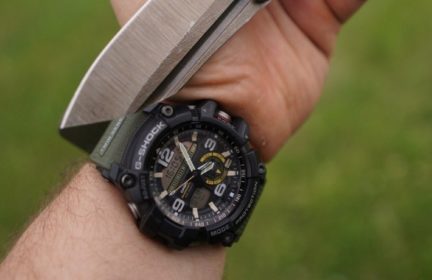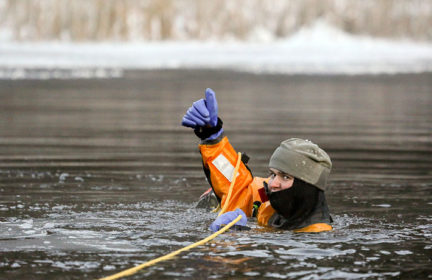What to do if you are lost while hiking?
You all probably have seen the recent news headline about a lost hiker that didn’t answer calls from Search and Rescue because he didn’t recognize the phone number. I take it he wasn’t desperately lost otherwise he would call for help if he has service and is receiving calls from unknown numbers right? Anyways, it got me thinking about what we should do if we are lost while hiking.
The number one thing you should always do when hiking is give an itinerary to loved ones at home and if you don’t keep by it let them know, otherwise you will have Search and Rescue out looking for you. Also, bring a small survival kit with you, even if it’s just a day hike.
What are some actual things you should do though if you are out in the middle of the woods and have no idea where you are because you got distracted by the beautiful scenery?
-
Best Replies
Mr. Mark Mr. Mark - November 4, 2021
I was lost once when a sudden snowstorm came up while I was deer hunting. This was long before cell phones and GPS were available. It is amazing how every step you take in the woods changes your perspective and even more so during a heavy snowfall. My tracks were literally being covered up within minutes. I found my way out because a) I knew the area I was hunting (i.e., surrounding roads and their layout) and b) I had a compass, and c) I didn’t panic. I knew there would be no one missing me for the next ten hours so I only had me and my preparation to depend on.
By contrast many years later my 17 year old son got lost while hunting when a sudden thunderstorm came up right at sunset. The area we were hunting was on the edge of a very large, unforgiving, and dangerous swamp so SAR was contacted when he was just an hour overdue. Instead of staying put he wandered aimlessly. At one point he fired 3 shots indicating he was lost or in danger, but immediately left the area before we got to where we heard the shots from. He finally came upon a farm and the farmer brought him back to our camp. He had traveled four miles through the woods and pouring rain before he finally saw lights from the farmhouse. He was lost for nine hours…all the while with a flashlight and compass in his pocket. He never thought to signal the SAR helicopter that flew over him twice. He forgot all about his compass. He totally panicked.
Be prepared! Know the area you will be in. Stay put unless you absolutely have to move. If you have one (and you should), use and trust your compass. Don’t expect your cell phone to have a signal. Don’t panic!
-
Comments (17)
-
Bob - October 28, 2021
Good evening Liz,
First and foremost:
Remain in same location if safe to do so. Eg, don’t remain on a river bank with rapidly rising waters.
Any dispatched SAR team will provide the mobility typically using a grid search. That’s why staying in place is important.
Related:
The mentioned small survival kit requires tailoring to the anticipated area and season. Eg, white ribbons of fabric to make an “X” on ground not for use on snow-covered ground.
NEVER hike alone. There’s a reason that recreational SCUBA divers are told to never dive alone. Less the levels of intensity, the reasoning is the same.
-
Bradical - October 29, 2021
Bob mentions some good points such as staying put and signaling with white ribbons.
When you realize you are lost, stop and take a minute to think. If you panic you will make a bad decision. I would move slightly if possible to get to a more visible and safer location. For example like Bob said with avoiding rising waters but also to get out of some dense trees to a nearby meadow where you can be more easily seen. If you do move, leave markers such as those white ribbons, torn pieces of bright clothing tied to branches at eye level, or rocks and sticks pointing as arrows in your direction of travel.
Create a small fire to stay warm and provide warmth, but keep a very large pile of wood nearby so that you can quickly throw it on if you hear rescuers and make it larger. Have green leaves and branches to throw on which will make a lot of smoke for signaling.
A whistle and signal mirror are wonderful things to have, hopefully you had brought both with you and can blow three bursts into the whistle or flash three times with the mirror. This is the international distress signal.
Conserve energy, warmth, food, and water as much as possible.
-
-
Mr. Mark - November 4, 2021
I was lost once when a sudden snowstorm came up while I was deer hunting. This was long before cell phones and GPS were available. It is amazing how every step you take in the woods changes your perspective and even more so during a heavy snowfall. My tracks were literally being covered up within minutes. I found my way out because a) I knew the area I was hunting (i.e., surrounding roads and their layout) and b) I had a compass, and c) I didn’t panic. I knew there would be no one missing me for the next ten hours so I only had me and my preparation to depend on.
By contrast many years later my 17 year old son got lost while hunting when a sudden thunderstorm came up right at sunset. The area we were hunting was on the edge of a very large, unforgiving, and dangerous swamp so SAR was contacted when he was just an hour overdue. Instead of staying put he wandered aimlessly. At one point he fired 3 shots indicating he was lost or in danger, but immediately left the area before we got to where we heard the shots from. He finally came upon a farm and the farmer brought him back to our camp. He had traveled four miles through the woods and pouring rain before he finally saw lights from the farmhouse. He was lost for nine hours…all the while with a flashlight and compass in his pocket. He never thought to signal the SAR helicopter that flew over him twice. He forgot all about his compass. He totally panicked.
Be prepared! Know the area you will be in. Stay put unless you absolutely have to move. If you have one (and you should), use and trust your compass. Don’t expect your cell phone to have a signal. Don’t panic!
-
Liz Klein - November 4, 2021
What a good example of panicking vs thinking rationally and calmly.
It’s good to hear that he was able to find the farm house, but he could have easily taken the wrong route, walked even deeper into the woods, and the story may have ended very differently.
-
hikermor - November 4, 2021
Like Daniel Boone, I have never been lost, but “I’ve been mighty confused for a few days.”
First thing, don’t panic. Stop and think – when were you last sure of your location? What landmarks are available? Consider the weather and the general situation. It is probably best to stay in one spot and not squander your energy.
A compass is useful, especially if you know how to use it, but even more useful is a good topo map, although they are not perfect – some are old and don’t show recent developments.
A fire may be a good idea, but not always. If conditions favor wild fires, it could be a bad mistake. If not, it is a great way to assist searchers.
A cell phone, if you have service, can be a real game changer. In thee old days, searches were generally started only after someone in town notifies the authorities, which can take days.
Have proper emergency gear with you, always – enough that you can survive at least one night out. This will vary drastically, depending on your location and the season.
It is often easier to orient yourself in rugged, distinctive terrain, than in a flat, relatively featureless woodland
-
Bob - November 4, 2021
Love that Daniel Boone quote ! Thank you, Hikermor.
Boone’s exploration resulting in “finding” the Cumberland Gap was financed by 2 merchants doing business in Richmond, Virginia.
…
Lost hikers would benefit by carrying a strobe.
-
-
RS - November 5, 2021
One of my favorite articles about how to constructively respond to getting lost is titled “Survival is all about a good cup of tea”:
The basic idea that I took from this article is that is very useful to cultivate habits that will help you if you get lost and start to panic. Let me rephrase that: you should develop a ritual/habits that will prevent you from making things worse if you get lost.
The ritual discussed in the article is: stop, setup a comfortable sitting place, and make a hot beverage (e.g., tea, coffee, whatever makes you happy). If stopping to make tea is something you can do in your sleep, it should be easier to convince your panicked brain “yes, we’re in trouble, so let’s just do this comforting tea ritual first and then decide what to do about the trouble.”
If you are lost, making a hot beverage does several important things:
- It stops you from continuing to move. As discussed by others, continuing to move makes it much, much, much harder for rescuers to find you. Continuing to move can also get your brain even more lost, so staying put gives you the chance to calm down and realize you do in fact know where you are, instead of rushing randomly into the forest and getting yourself even more turned around.
- It encourages you to make your environment safer for staying put. If every time you go out hiking, you’re planning to stop for tea, there’s a chance you’ll bring some sort of shelter (like a tarp), or at least have practice figuring out comfortable places to sit in the woods (under a tree, moving brush around to block any cold wind, or finding a breezy and shady spot if it’s hot and there are biting insects). This helps you comfortably stay put (see #1).
- It lets you take action (which reduces your anxiety) by creating an external heat source and also rehydrating yourself with an internal heat source. If you are going to be stuck out overnight, it’s probably better to gather wood/start a fire for the evening when it’s lighter out and your hands are still warm. (Or when you still have enough fuel in your camping stove to use it as a blow torch to help you light damp wood.) If you’re trying to calm yourself down and figure out where you are, making sure you are properly hydrated and your core temperature is warm enough will help your brain work far better. (Look up the effects of dehydration and hypothermia on the mind if you don’t know what I mean.)
Aside from habit(s) to prevent yourself from making things worse, I’d recommend the following preparations (things you should do before getting lost):
- the priority you mentioned: leaving an itinerary with a responsible person, and on that itinerary including a clear “this is when you should consider me overdue” cut off time point and the number call to begin SAR
- navigation training: learning to read maps and use compasses. this reduces your chance of getting lost, but if you get lost, knowing how to draw a topo map of your surroundings and look for landmarks to triangulate with increases your chances of getting unlost. navigation includes little habits like taking a “back bearing” if you step offtrail, and learning about handrails around you.
- practice creating an overnight shelter with the gear you carry: typical wilderness survival fun stuff–physically practice it before you need to use it.
- practice creating signals and communicating: smoke, campfire smells, using whistles instead of yelling yourself hoarse, placing flagging tape, field expedient objects to spell out “SOS” or “XXX” or “HELP” in a field for aircraft to see, carrying a PLB-type device (garmin, SPOT), etc.
-
Bob - November 5, 2021
Good evening RS,
This is some of the best guidance I’ve ever read asembled in one place.
It is valuable. Thank you for helping Forum members with this info.
The US Army had a folding stool with the issued field desk/table. It was just too heavy and inconvenient to carry as a private citizen prepper so thoughts here are to have something rubbery/plastic to sit on as a minimum. An extra space blanket can be ideal.
I liked reading about carrying something that will be a shelter.
Am an avid coffee consumer so besides my loved habit of coffee … includes espresso … my small espresso pot and fuel tabs for mini-stove can now be viewed as both just for dining outdoors and also survival gear.
Time for another espresso ! A great post !
-
Olly Wright - November 6, 2021
You have motivated me to add a small package of hot chocolate to my hiking pack. Taking the time to stop and make a cup will boost moral and help you to think clearly. The sugar and chocolate will also give a good energy boost!
-
Keith Benefiel - November 8, 2021
Do you carry a bug-out pack everywhere? What is in your pockets? After 10 years with Teton County, WY SAR, I made a list of the most common items the folks we searched for DIDN’T have with them.
1. Good signaling whistle. Metal best so it won’t break in your pocket. Acme Thunderer is a good brand.
2.Waterproof matches or BiC. Non-smokers need to remember this. Fire is a signal, too.
3.First aid. For hundreds of years, this has been the triangular bandage. An extra large bandana is perfect. Make it a red one, for signaling.
4. Cheap $5 button compass. This is just to keep you from going in a circle. It happens. A small sighting compass also has a mirror for signaling.
5.Small, simple pocket knife that is comfortable in your pocket.
6. If enough pockets, a folded garbage bag for emergency raincoat or bivy.
Don’t count on always having a pack. If you have your pants on, you have your basic survival gear. Cheers KB
-
Bradical - November 8, 2021
Very good list of tips! I agree with all of them and they are very easy and cheap for everyone to have with them.
Do you have any interesting stories from being with Search and Rescue?
-
Liz Klein - November 9, 2021
I’m with Bradical, I would love to hear some stories of people being rescued and what got them into the state of being lost. Also what did they do to signal rescuers and be found.
-
-
Bill Masen - November 8, 2021
I dont get lost, I get geographically challenged 🙂
-
JennyWren - November 9, 2021
I like to use this acronym
S.T.O.P.: Stop, Think, Observe, Plan
Planning and preparation should keep you from having an outdoor misadventure. If an emergency does occur, you should remember and follow the S.T.O.P. principle.Stop: Remain calm, and analyse the situation.
Think: Decide what you need to do to survive.
Observe: Survey the terrain, and look for familiar landmarks.
Plan: Figure out the next best course of action. Don’t wait until dark to plan!
Lifted this from Hunter-ed.com for convenience
Learned many years ago in the Girl Guides but it’s still relevant today.
I would add, if you are genuinely lost and unable to find any familiar landmarks then shelter in place and make yourself known either visibly or with noise. A good whistle and bright bivvy bag are worth making room for.
-
Liz Klein - November 9, 2021
Acronyms like this are helpful for me. I have to repeat it a few times but then it gets stuck in my brain and I use it often.
-
-
Scott P - November 29, 2021
In general exactly what others have said. Stop if you are in a safe location or get yourself to one and stop. Layer up, it is easier to stay warm than to get warm (obviously location and time of year dependent). If you are really lost activate whatever SOS device you have, which to be perfectly honest you should have in this day and age. The versions that allow two way comms are best, like the in reach or spot x. Once you do that STAY WHERE YOU ARE. Signaling with a whistle/signal mirror are also very helpful. Also make sure some bit of gear is bright, it could be your pack, a pack cover, tarp, or jacket, or all the above.
More importantly there are some ways to help not get lost. First periodically look back the way you came, this can help if you get slightly misplaced to retrace back to a last known area or trail. Modern phones with a good outdoor map program with the maps downloaded are great. Just remember to keep it in airplane mode, which will preserve battery but the gps receiver will still function. Carry a compass and map as backup (also learn to use them). Also you can use something like fatmaps prior to your trip to get an idea of terrain features, which is especially useful in mountainous terrain. I also always have 2 headlamps, one really bright primary and one small and light one as a backup. The backup usually goes in my first aid kit so it is easier to find and even switching packs I will at least have that one.
-
Jay ValenciaContributor - November 29, 2021
When you talked about using an outdoor map program on your phone, that can help you to not get lost if it tracks your movements and route from which you came. If you get lost, just open the app and take the route you just took to get there. I like that idea.
Definitely have an SOS device, and other simple signalling methods in case you were to lose your phone or it died, but retracing your steps with the routing app is pretty slick.
-
-
- Has anybody blood tested the Oroweat keto tortillas? - 2 days ago
- News for the Week 2024-04-22 - 2 days ago
- News for the Week 2024-04-15 - 3 days ago
- What is the best camp stove for an emergency power outage or camping? - 5 days ago
- Chickens for preppers: Important considerations - 5 days ago
This forum is heavily moderated to keep things valuable to as many people as possible. Full community policies are here. The basics:
- 1. Be nice to each other.
- 2. Stay focused on prepping.
- 3. Avoid politics, religion, and other arguments.
- 4. No unfounded conspiracies, fake news, etc.
- 5. Debate ideas, not people.
